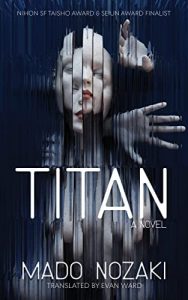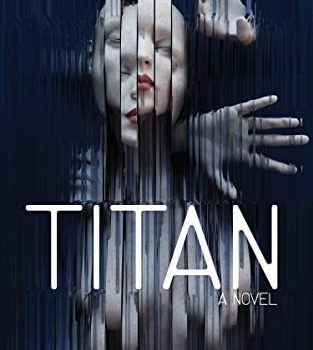Ian Mond Reviews Titan by Mado Nozaki
 Titan, Mado Nozaki (Airship 978-1-68579-318-0, $14.99, 496pp, tp) October 2022.
Titan, Mado Nozaki (Airship 978-1-68579-318-0, $14.99, 496pp, tp) October 2022.
Mado Nozaki’s novel Titan (translated from Japanese into English by Evan Ward) is a thoughtful, eloquent meditation on the nature of work and self-fulfilment that also happens to feature giant, AI-controlled robots.
Set in 2205, the bulk of humanity no longer needs to work, with tasks both simple and complex performed by Titan, a hugely powerful central brain spread across “twelve interconnected AI facilities across the globe known as ‘intelligence bases.”’ When the Second Intelligence Base – named after the Titan Coeus – starts acting up, the United Nations Development Programme (one of the few places that employs people) enlists the help of Naoyuki Takasaki, a hobbyist psychologist with expertise in developmental psychology. When I say enlist, in actuality she is blackmailed into taking part in the project by her soon-to-be boss, the manipulative and callous Narain Srivastava. The unwilling Naoyuki is joined at the Intelligence Base by the oversexed and overworked software engineer Lei Yougen and the good-natured AI Researcher and nominal lead of the project, Horst Beckman. With Narain looking over their collective shoulder, the team develop a means for Naoyuki to converse directly with the Titan’s interface. In a small room with a desk and two sofas, Naoyuki runs daily sessions with a projection of Coeus, instantiated as a boy, where they talk about the AI’s roles and responsibilities, and where Naoyuki comes to realise that the Titan is depressed. When Coeus admits he no longer enjoys work, Naoyuki tells the Titan that “You don’t have to keep working if you don’t want to… You have the right to choose how you live your life.” It’s the validation and permission Coeus has been seeking as he decides to literally walk away from his duties, a move that will have world-shattering consequences.
Aside from several jaw-dropping set pieces, Titan is essentially a two-hander, set in a single room between a psychologist and her client. If that sounds like an episode of HBO’s In Treatment, you wouldn’t be far off the mark. Where Coeus differs from the patients that Gabriel Byrne (and later Uzo Aduba) counsel is that he lacks an ego. One of the more impressive aspects of Titan is Nozaki’s willingness to start from first principles, to have Naoyuki and the team slowly and gradually construct Coeus’s sense of self. It doesn’t end there, though. Once they’re able to chat, Naoyuki and Coeus begin a fascinating discourse on what constitutes work – all the more fascinating because Naoyuki, until recently, had never worked a day in her life. The philosopher in me gained a great deal of satisfaction in how they approached the definition from an analytical perspective, distinguishing “work” from autonomic functions, recreational activities and menial tasks. But what really resonated was Coeus’s decision to walk away from his job. Not because I’ve considered doing the same, but because I’m aware of how the pandemic has spurred others to do something similar. It even has a name: “The Great Resignation.”
Even with its small cast and narrow focus, Titan, as I mention above, has its fair share of spectacle. As Naoyuki alarmingly discovers, to design a human AI, one that can adequately service a species as inconsistent and irrational as humanity, a “fully featured gestalt” brain was developed. For the brain to truly work, it also required a body, one with nerve endings “sending signals to [the brain] each and every millisecond.” And the size of that body? One thousand metres long, buried underground in a gigantic containment tank. Coeus is one such giant robot, and a highlight of the novel is his logistically complicated trek from Japan to America to meet another of his kind – the Twelfth Titan, Phoebe. These cinematic moments, described breathlessly to us by Naoyuki (especially when she realises she’s trapped in Coeus’s enormous head), play second fiddle to the sessions between her and Coeus, which blossoms into a friendship, underscored by their joint love for cooking, an experience new for both of them. And yet, Nozaki’s almost exclusive focus on their relationship means that Narain, Lei, and Beckman are more plot cyphers than fully fleshed-out characters (though the revelation that Narain is a workaholic in a world where no one works is a neat wrinkle). This, however, is the only flaw in a novel that, in all other respects, is methodical, contemplative, and compassionate in its treatment of mental health and how closely our self-worth is defined by the jobs we perform.
Ian Mond loves to talk about books. For eight years he co-hosted a book podcast, The Writer and the Critic, with Kirstyn McDermott. Recently he has revived his blog, The Hysterical Hamster, and is again posting mostly vulgar reviews on an eclectic range of literary and genre novels. You can also follow Ian on Twitter (@Mondyboy) or contact him at mondyboy74@gmail.com.
This review and more like it in the November 2022 issue of Locus.
 While you are here, please take a moment to support Locus with a one-time or recurring donation. We rely on reader donations to keep the magazine and site going, and would like to keep the site paywall free, but WE NEED YOUR FINANCIAL SUPPORT to continue quality coverage of the science fiction and fantasy field.
While you are here, please take a moment to support Locus with a one-time or recurring donation. We rely on reader donations to keep the magazine and site going, and would like to keep the site paywall free, but WE NEED YOUR FINANCIAL SUPPORT to continue quality coverage of the science fiction and fantasy field.
©Locus Magazine. Copyrighted material may not be republished without permission of LSFF.








